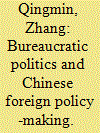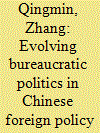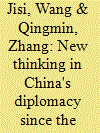| Srl | Item |
| 1 |
ID:
149800


|
|
|
|
|
| Summary/Abstract |
This article tries to bridge the bureaucratic politics model of foreign policy analysis (FPA), which is based on American foreign policy practice, and Chinese foreign policy studies. It traces the development and discusses the Chinese features of the bureaucratic politics model, and analyses the evolving bureaucratic political process of Chinese foreign policy-making. Its conclusion is that the foreign policy-making process of the People’s Republic of China (PRC) has progressed from ideology-based ‘line battles’ to personal relationship (guanxi)-based in-party competition, and from factional competition under one paramount leader to government politics wherein many participants vie for different policies. As China integrates more deeply into the international community, and communist ideology loses its political validity in Chinese politics, bureaucratic politics in China exhibits more prominent Chinese cultural features, and at the same time shares greater similarities with the bureaucratic politics in western democratic countries. Therefore, to avoid rigidity, attention must be paid to variances in bureaucratic politics as applied in the Chinese context. Bridging FPA theory and Chinese foreign studies is hence both viable and beneficial for the construction of FPA theories beyond the United States and for China’s foreign policy research.
|
|
|
|
|
|
|
|
|
|
|
|
|
|
|
|
| 2 |
ID:
142087


|
|
|
|
|
| Summary/Abstract |
Growing economically more powerful and confident, China is exerting unprecedented influence on global affairs. But the diverse voices and sometimes inconsistencies in its foreign policy behavior have confused many China watchers. Such phenomena demonstrate some new trends in Chinese foreign policy. In order to unveil such trends, this paper intends to look at Chinese foreign policy practices by employing the theoretical framework of bureaucratic politics. Its conclusion is that the foreign policy-making process of the People’s Republic of China (PRC) has progressed from the ideology based in-party factionalism of “line battles” to interest-based government politics of organizational competition. The early stage has distinctive Chinese characteristics, which are different from Western bureaucratic politics. But as Chinese society becomes more diversified, the bureaucratic politics in China begins to share more similarities with those in the Western democracies. Such trends render the application of Foreign Policy Analysis (FPA) to the research of Chinese foreign policymaking both necessary and beneficial to the construction of theories of foreign policy analysis, as well as research on China’s foreign policy itself.
|
|
|
|
|
|
|
|
|
|
|
|
|
|
|
|
| 3 |
ID:
085741


|
|
|
| 4 |
ID:
018499


|
|
|
|
|
| Publication |
Feb 2001.
|
| Description |
89-106
|
| Summary/Abstract |
This article analyzes the United States 'dual track' policy on arms sales and technology transfers to the China mainland and Taiwan. Despite its 'one China' policy, the US has continued to sell arms to Taiwan and provide Taiwan with military technology. At the same time, Washington is unwilling to transfer certain technology to the China mainland. The US 'dual track' policy of arms sales and technology transfer to both sides of the Taiwan Strait has maintained a strategic balance by developing closer relations with Beijing while maintaining the security of the Republic of China on Taiwan. Washington's objectives are to enhance Sino–American relations and to maintain Taiwan's security while not unsettling the generally positive Sino–American relationship. While this policy has caused tensions in US–PRC relations, this 'unbalanced balance' has served US interests in maintaining Taiwan's security and has not strained Washington–Beijing relations to the breaking point.
|
|
|
|
|
|
|
|
|
|
|
|
|
|
|
|